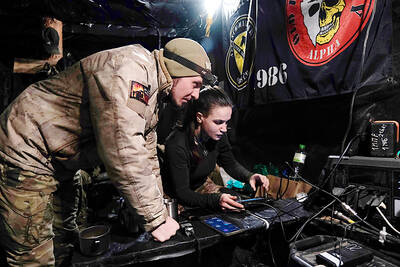The US war in Iraq is a "lost battle" and the violence-ravaged nation's "dire" plight seems certain to see it shatter along ethnic lines, an adviser to the Saudi government is warning.
The damning analysis, unveiled in a presentation at a two-day conference on US-Arab relations here, sees violence in Iraq getting worse and alleges large-scale Iranian "interference" there is set to grow.
"It is already a lost battle," said Nawaf Obaid, Managing Director of the Saudi National Security Assessment project, at the annual policymakers conference of the National Council on US-Arab Relations.
The question in Iraq is not "if the US succeeds -- it has failed by every single measure that you can think of," said Obaid, private security and energy adviser to the Saudi ambassador to Washington, Prince Turki al-Faisal.
"The failure is only compounded by the fact that we just don't know what the endgame is," said Obaid, head of the Riyadh-based independent consultancy which advises the Saudi government.
The presentation was released as debate on Iraq reached fever pitch on the US campaign trail ahead of crucial mid-term elections next week, and as foreign policy analysts here predict a possible change of US direction.
US President George W. Bush last week asserted that the US is winning in Iraq, where more than 100 US troops died last month, and that political and security progress is being made.
The study concluded that a Kurdish drive for quasi-independence within Iraq would gather speed, as would the insurgency, and Iranian influence in the country could be expected to increase as US influence waned.
US Vice President Dick Cheney said in an interview on Tuesday that violence would go on "for some considerable period of time in Iraq," but argued progress had been made.
Obaid said in his presentation that the Sunni-led insurgency in Iraq showed no sign of abating, that conditions were being exacerbated by Iranian interference and questioned whether the Iraqi government could bring stability.
"All indications point to a current state of civil war and the disintegration of the Iraqi state," Obaid said, adding that Saudi leaders had been trying to counter what he said were US misconceptions about Iraq.
"Unfortunately the assessment is very dire, and we don't think there is a possibility now to avoid a potential disintegration of Iraq," he said.
The presentation claimed that there had been large-scale "infiltration, funding and arming" of Shiite militias by the Iranian Revolutionary Guard.
Shiite officers with ties to the guard and Iran's Ministry of Intelligence had also infiltrated newly created Iraqi army and police forces, the report said.
US Secretary of State Condoleezza Rice on Tuesday warned in an interview with CNBC against Iranian interference in Iraq.
"[Iran] does need to understand that it is not going to improve its own situation by stirring instability in Iraq," she said.
"It's going to simply create a neighbor with which it will have problems well into the future," Rice said.

THE TRAGEDY OF PUNCH: Footage of the seven-month-old Japanese macaque has gone viral online after he was rejected by his mother and formed a bond with a soft toy A baby monkey in Japan has captured hearts around the world after videos of him being bullied by other monkeys and rejected by his mother went viral last week. Punch, a Japanese macaque, was born in July last year at Ichikawa City Zoo. He has drawn international attention after zookeepers gave him a stuffed orangutan toy after he was abandoned by his mother. Without maternal guidance to help him integrate, Punch has turned to the toy for comfort. He has been filmed multiple times being dragged and chased by older Japanese macaques inside the enclosure. Early clips showed him wandering alone with

Australian Prime Minister Anthony Albanese yesterday said he did not take his security for granted, after he was evacuated from his residence for several hours following a bomb threat sent to a Chinese dance group. Albanese was evacuated from his Canberra residence late on Tuesday following the threat, and returned a few hours later after nothing suspicious was found. The bomb scare was among several e-mails threatening Albanese sent to a representative of Shen Yun, a classical Chinese dance troupe banned in China that is due to perform in Australia this month, a spokesperson for the group said in a statement. The e-mail

‘OCCUPATION’: Hong Kong said it had lodged ‘stern protests’ with Panama’s consulate, and would ‘staunchly support’ the rights and interests of Hong Kong companies Panamanian President Jose Raul Mulino on Monday ordered the temporary occupation of two ports run by a unit of CK Hutchison Holdings Ltd following the Supreme Court’s ruling against the firm’s concession, escalating a dispute that has become a proxy battle between the US and China in Latin America. Mulino said in a speech that the administration and operation of the two ports on the strategic Panama Canal is to revert to the country’s National Maritime Authority to ensure their uninterrupted, safe and efficient operation. The occupation covers movable equipment at the ports and does not mean a definitive loss of

GAME CHANGER The Russian invasion of Ukraine has shown the utility of small drones for recon, for supporting logistics and for killing across the modern battlefield Five European nations have announced a new program to produce low-cost air defense systems and autonomous drones using Ukrainian expertise, hard-won over the past four years fighting against Russia. Friday’s initiative of the five nations — France, Poland, Germany, the UK and Italy — comes as one of many European efforts to bolster defense along their borders, like a “drone wall ” with Russia and Ukraine to better detect, track and intercept drones violating Europe’s airspace. Both Moscow and Kyiv have cutting-edge drone warfare capabilities forged in the grim laboratory of war where battlefield innovations have rewritten modern battle tactics. Poland is